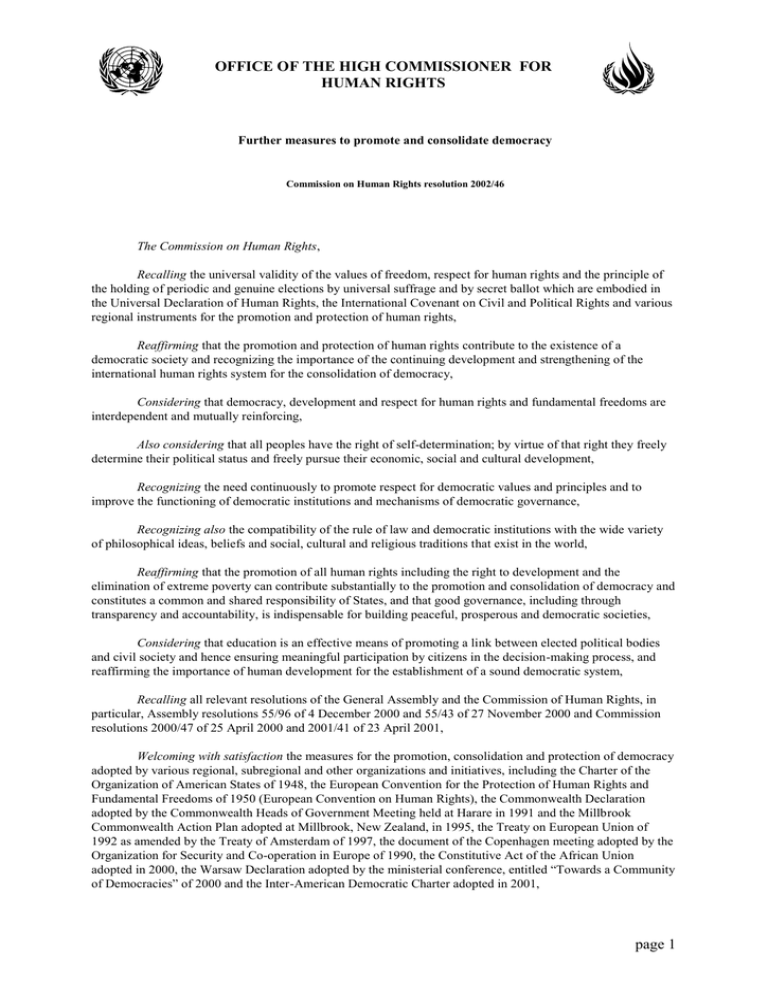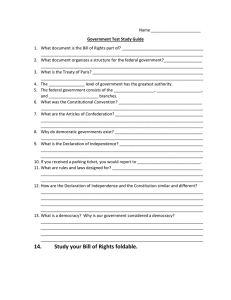OFFICE OF THE HIGH COMMISSIONER FOR HUMAN RIGHTS
advertisement

OFFICE OF THE HIGH COMMISSIONER FOR HUMAN RIGHTS Further measures to promote and consolidate democracy Commission on Human Rights resolution 2002/46 The Commission on Human Rights, Recalling the universal validity of the values of freedom, respect for human rights and the principle of the holding of periodic and genuine elections by universal suffrage and by secret ballot which are embodied in the Universal Declaration of Human Rights, the International Covenant on Civil and Political Rights and various regional instruments for the promotion and protection of human rights, Reaffirming that the promotion and protection of human rights contribute to the existence of a democratic society and recognizing the importance of the continuing development and strengthening of the international human rights system for the consolidation of democracy, Considering that democracy, development and respect for human rights and fundamental freedoms are interdependent and mutually reinforcing, Also considering that all peoples have the right of self-determination; by virtue of that right they freely determine their political status and freely pursue their economic, social and cultural development, Recognizing the need continuously to promote respect for democratic values and principles and to improve the functioning of democratic institutions and mechanisms of democratic governance, Recognizing also the compatibility of the rule of law and democratic institutions with the wide variety of philosophical ideas, beliefs and social, cultural and religious traditions that exist in the world, Reaffirming that the promotion of all human rights including the right to development and the elimination of extreme poverty can contribute substantially to the promotion and consolidation of democracy and constitutes a common and shared responsibility of States, and that good governance, including through transparency and accountability, is indispensable for building peaceful, prosperous and democratic societies, Considering that education is an effective means of promoting a link between elected political bodies and civil society and hence ensuring meaningful participation by citizens in the decision-making process, and reaffirming the importance of human development for the establishment of a sound democratic system, Recalling all relevant resolutions of the General Assembly and the Commission of Human Rights, in particular, Assembly resolutions 55/96 of 4 December 2000 and 55/43 of 27 November 2000 and Commission resolutions 2000/47 of 25 April 2000 and 2001/41 of 23 April 2001, Welcoming with satisfaction the measures for the promotion, consolidation and protection of democracy adopted by various regional, subregional and other organizations and initiatives, including the Charter of the Organization of American States of 1948, the European Convention for the Protection of Human Rights and Fundamental Freedoms of 1950 (European Convention on Human Rights), the Commonwealth Declaration adopted by the Commonwealth Heads of Government Meeting held at Harare in 1991 and the Millbrook Commonwealth Action Plan adopted at Millbrook, New Zealand, in 1995, the Treaty on European Union of 1992 as amended by the Treaty of Amsterdam of 1997, the document of the Copenhagen meeting adopted by the Organization for Security and Co-operation in Europe of 1990, the Constitutive Act of the African Union adopted in 2000, the Warsaw Declaration adopted by the ministerial conference, entitled “Towards a Community of Democracies” of 2000 and the Inter-American Democratic Charter adopted in 2001, page 1 1. Declares that the essential elements of democracy include respect for human rights and fundamental freedoms, freedom of association, freedom of expression and opinion, access to power and its exercise in accordance with the rule of law, the holding of periodic free and fair elections by universal suffrage and by secret ballot as the expression of the will of the people, a pluralistic system of political parties and organizations, the separation of powers, the independence of the judiciary, transparency and accountability in public administration, and free, independent and pluralistic media; 2. Reaffirms that the full exercise of fundamental freedoms and human rights - which are universal, indivisible and interdependent - can only take place within democratic systems; 3. Also reaffirms that free and fair elections are an essential feature of democracy and must be part of a broader process that strengthens democratic principles, values, institutions, mechanisms and practices, which underpin the rule of law; 4. Invites Member States, relevant intergovernmental organizations and interested nongovernmental organizations to continue to foster and participate in a systematic dialogue on the building of democratic societies and on factors in the success and failure of processes of democratization, and takes note of the recent conferences on the topic of democratization held since the fifty-seventh session of the Commission, including the Conference on Democratic Transition and Consolidation, held in Madrid in October 2001; 5. Welcomes the adoption by various regional, subregional and other organizations and initiatives of institutional rules and structures which recognize the interdependent relationship between democracy and the protection of human rights, as well as the adoption of mechanisms designed to promote it, to prevent situations which affect or threaten democratic institutions, or to implement measures for the collective defence of democracy in the event of a serious disturbance or disruption of the democratic system; 6. Encourages States to promote the contribution of organizations of civil society to the promotion of good governance, sound administration, democratic values and the enhancement of the quality of democracy; 7. Also encourages the paying of particular attention to the recommendation by the SecretaryGeneral that the United Nations should work to develop integrated democracy assistance programmes and common country strategies that are locally owned and which involve a wide array of local actors; 8. Calls for information sharing and improved coordination within the United Nations system so as to facilitate the exchange of lessons learned and best practices for promoting and consolidating democracy; 9. the world; Encourages the development of broad-based democracy expertise drawn from all regions of 10. Takes note with interest of the working paper on the measures provided in the various international human rights instruments for the promotion and consolidation of democracy (E/CN.4/Sub.2/2001/32), submitted in accordance with the mandate contained in decision 2000/116 of the SubCommission on the Promotion and Protection of Human Rights of 18 August 2000 and requests the SubCommission to continue with that mandate; 11. Urges the Office of the United Nations High Commissioner for Human Rights to invite the views of various regional, subregional and other organizations and arrangements on the role they play in promoting and consolidating democracy, and to report to the Commission on the conclusions resulting therefrom at its fifty-ninth session; 12. Requests the Secretary-General and the Office of the High Commissioner to bring the present resolution to the attention of Member States, the competent United Nations organs and relevant intergovernmental and interested non-governmental organizations, and to disseminate it on the widest possible basis; 13. Decides to continue consideration of the matter at its fifty-ninth session under the same agenda item. page 2 51st meeting 23 April 2002 [Adopted by a recorded vote of 43 to none, with 9 abstentions. E/2002/23- E/CN.4/2002/200, see chap. XI.] page 3






